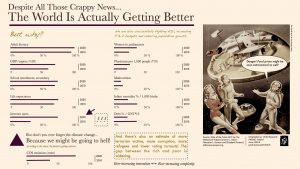Rifkin, in his piece Empathic Civilization, dissects what has been seen as a fundamental dichotomy of the interpretation of the direction of humanity in regards to its social and ecological implications. Rifkin asserts that the laws of thermodynamics apply not only to the base elements composing our Earth- that individual elements and units of energy cannot be created nor destroyed, and that the availability and use of their energy is in constant transformation- but also to broader social and ecological processes.

A recent contemplative practice our class held encouraged meditation on whether we believed that the world was getting ‘better’ or ‘worse’. In the context of this course, I immediately concluded that the world was getting worse. It seemed inevitable, considering the increasing global temperatures and atmospheric CO2 emissions strengthening climatic disasters, ecological degradation decreasing biological diversity, and a growing human population increasing food and water scarcity.
However, after returning to this practice later, I realized what I had missed in my analysis by approaching it through an ecological framework. I realized that child mortality is lower than ever before, and the rate at which it has been falling has been increasing for the past 2 decades (Brookings Institute). The percentage of children in low income countries that are vaccinated has increased to 80% (WHO/UNICEF), and the percentage of people around the world who live in absolute poverty has decreased to fewer than 10% (OurWorldInData.org/extreme-poverty/).
Rifkin notes that our expansion into globalization has coincided with a deepening sense of empathy and identification with a broader and more inclusive world community. That each new interaction in turn has strengthened our personal senses of self. Our accumulation of knowledge and experience, contingent on abundance, has allowed humanity to begin to penetrate the extent of human consciousness and explore the mystery of existence.

However, consistent with thermodynamic law, our societal development has coincided with the degradation of the environment: the leaching of resources from their original use into objects for human use, and the waste from such.
This begs the question of what constitutes how we define our ‘world’: social, psychological, or ecological, as it seems that our mental advances have kept pace with environmental destruction.
Just as we begin to be able to explore and theorize on the meaning of life, life as we know it is seemingly coming to an end.
Perhaps we were never meant to know.

